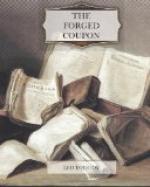One day the magistrate, visiting the prison cells, asked Stepan whether there was anything he had to complain of, or whether he had any wishes that might be granted him. Stepan said he had no wishes whatever, and had nothing to complain of the way he was treated in prison. The magistrate, on leaving him, took a few steps in the foul passage, then stopped and asked the governor who had accompanied him in his visit how this prisoner was behaving.
“I simply wonder at him,” said the governor, who was very pleased with Stepan, and spoke kindly of him. “He has now been with us about two months, and could be held up as a model of good behaviour. But I am afraid he is plotting some mischief. He is a daring man, and exceptionally strong.”
II
During the first month in prison Stepan suffered from the same agonising vision. He saw the grey wall of his cell, he heard the sounds of the prison; the noise of the cell below him, where a number of convicts were confined together; the striking of the prison clock; the steps of the sentry in the passage; but at the same time he saw her with that kindly face which conquered his heart the very first time he met her in the street, with that thin, strongly-marked neck, and he heard her soft, lisping, pathetic voice: “To destroy somebody’s soul . . . and, worst of all, your own. . . . How can you? . . .”
After a while her voice would die away, and then black faces would appear. They would appear whether he had his eyes open or shut. With his closed eyes he saw them more distinctly. When he opened his eyes they vanished for a moment, melting away into the walls and the door; but after a while they reappeared and surrounded him from three sides, grinning at him and saying over and over: “Make an end! Make an end! Hang yourself! Set yourself on fire!” Stepan shook all over when he heard that, and tried to say all the prayers he knew: “Our Lady” or “Our Father.” At first this seemed to help. In saying his prayers he began to recollect his whole life; his father, his mother, the village, the dog “Wolf,” the old grandfather lying on the stove, the bench on which the children used to play; then the girls in




